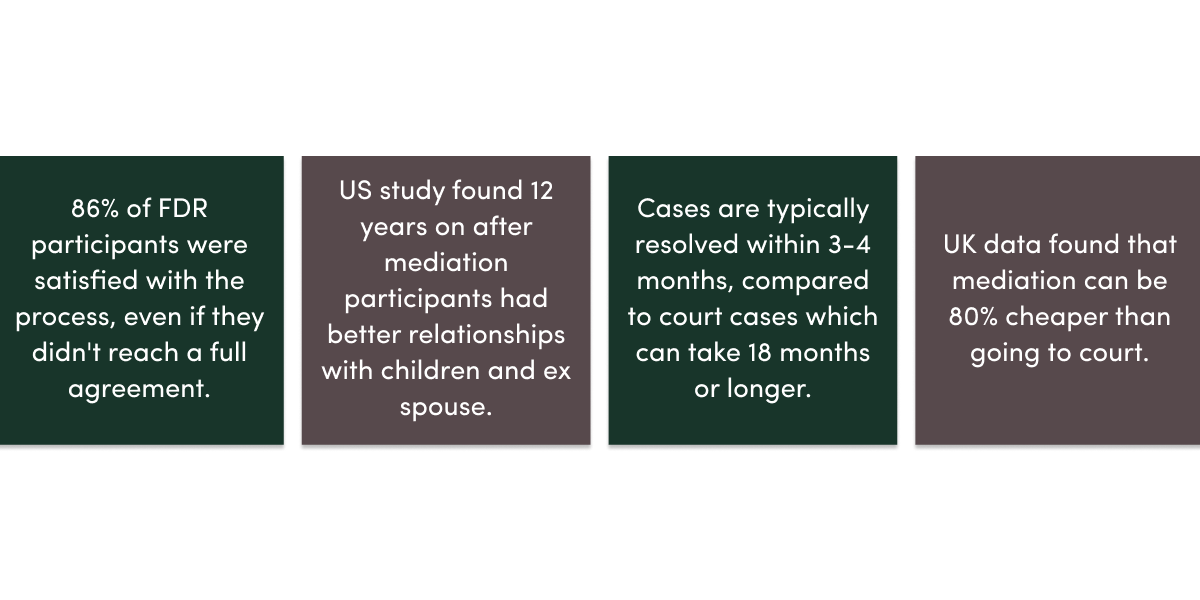Family Mediation Tips: Navigating High Emotions

When relationships break down, family mediation, also known as Family Dispute Resolution (FDR), offers a constructive pathway to resolving conflicts without resorting to court battles.
It is crucial to attend mediation with an open mind and a willingness to cooperate, as this can significantly increase the chances of reaching an amicable resolution.
At Perth Divorce Lawyers, we understand the challenges you face and are here to guide you through this process with expertise and empathy. This comprehensive guide will walk you through the essentials of family mediation, providing valuable tips to help you achieve the best possible outcome for your unique journey to resolution.
Understanding Family Dispute Resolution (FDR)
Family Dispute Resolution is a structured process designed to help separating couples resolve disputes related to property division and children’s matters. In Western Australia, FDR with respect to children’s matters is governed by the Family Court Act 1997 (WA), section 66H as well as the Family Law Act 1975 (Cth.), section 60I.
Under Australian family law, with some exceptions, Family Dispute Resolution is a compulsory step for separated parents before applying to a Family Law Court for parenting orders. The process aims to facilitate open communication and negotiation between parties, with the goal of reaching mutually acceptable agreements.
Who attends FDR?
- Separating or divorcing couples
- Parents with disputes over property and child-related issues
- In some cases, other family members or support persons (with agreement from all parties)
The mediator, a neutral third party, helps facilitate discussions but does not make decisions for the participants. Their role is to guide the conversation, ensure both parties are heard and help identify potential solutions.
What does Mediation and FDR cost?
The cost of mediation can vary depending on the service provider and the complexity of your case. Some community-based services offer reduced fees based on income, while private mediators may charge hourly rates. At Perth Divorce Lawyers, we provide transparent fee structures and can discuss costs during your initial consultation.
It’s important to note that while there is a cost associated with mediation, it is generally significantly less expensive than going to court. Additionally, the potential for a faster resolution can lead to further cost savings in the long run.
Common Key Issues in Family Mediation
Property Division
One of the most significant aspects of family mediation is resolving property matters.
- Division of assets and liabilities
- Superannuation splitting
- Dealing with the family home
- Valuation of businesses or other complex assets
- Considering future financial needs of both parties
Property division can be particularly complex in cases involving high-net-worth individuals or when there are business assets to consider. Our team at Perth Divorce Lawyers is well experienced in property settlements and can provide guidance throughout the mediation process.
Children’s Matters
When children are involved, mediation focuses on:
- Parenting arrangements (including living arrangements and visitation schedules)
- Child support
- Education decisions
- Health and welfare considerations
- Communication between parents
- Holiday and special occasion arrangements
Effective communication with your ex-partner is crucial in developing a cooperative co-parenting relationship, which benefits the children’s long-term well-being and their relationship with each parent. The primary focus in these discussions is always the best interests of the children. Mediation can help parents develop a cooperative co-parenting relationship, which is beneficial for the children’s long-term wellfare.

Top Tips to Get the Most from the Mediation Process
Start by preparing thoroughly and familiarising yourself with the process ahead, preparation is key to a successful mediation. Thorough preparation is key to resolving family law disputes effectively during mediation.
- Determining your priorities: What are your non-negotiables and where are you willing to compromise?
- Understanding your legal rights: Familiarise yourself with relevant family law in Western Australia by taking independent legal advice.
- Collating relevant documents (financial statements, property valuations, etc.)
- Making an honest attempt to resolve issues before mediation: Try to identify areas of agreement and disagreement beforehand.
Our experienced family lawyers can help you prepare effectively for your mediation session, ensuring you have all the necessary information and documentation at hand.
Manage Your Emotions
Emotional management is crucial to a balanced and constructive mediation process.
- Stay calm and focused: Practise deep breathing or other relaxation techniques if needed
- Practice self-care and seek support if needed: Consider counselling or therapy to help process your emotions
- Remember that mediation is about finding solutions, not rehashing past conflicts
- Take breaks during the mediation session if you feel overwhelmed
Be Aware of Your Communication
Effective communication can help steer meditation to an amicable and fair outcome.
- Using “I” statements to express your needs and concerns: For example, “I feel concerned about…” rather than “You always…”
- Listening actively to understand the other party’s perspective: Try to paraphrase what you’ve heard to ensure understanding
- Choosing your words carefully to avoid escalating tensions: Focus on the issue at hand rather than personal attacks
- Being open to feedback and willing to clarify your points if misunderstood
Prepare for Roadblocks
Anticipate potential challenges and be ready to address them constructively.
- Identifying key issues in advance: What are the likely sticking points?
- Considering alternative solutions to common sticking points: Come prepared with several options
- Being open to compromise while maintaining your core priorities
- Being open to compromise and negotiation with the other party can help overcome potential roadblocks
- Seeking advice from your lawyer on how to navigate difficult topics
Ensure Your Safety
If there are any safety concerns, inform your mediator or legal representative immediately. In cases involving family violence, it is crucial to inform your mediator or legal representative to ensure appropriate safety measures are in place. Mediation should always take place in a safe and secure environment. Options such as separate waiting areas or even shuttle mediation (where parties are in separate rooms) can be arranged if necessary.
Be Ready to Compromise
Successful mediation often requires flexibility from both parties.
- An open mind: Be willing to consider perspectives and solutions you hadn’t thought of before
- Willingness to consider alternative solutions: Sometimes, creative problem-solving can lead to win-win outcomes
- A focus on the big picture and long-term outcomes: Consider how decisions will impact your life in the years to come
- Realistic expectations: Perfect solutions are rare, but good compromises are achievable
Understand the Costs
Be clear about the financial aspects of mediation.
- Know the mediator’s fees and any additional costs: Ask for a clear breakdown of expenses
- Consider how mediation costs will be shared between parties: This can often be a point of negotiation
- Weigh the cost of mediation against potential legal fees for court proceedings: Mediation is typically much less expensive than litigation
- Budget for potential outcomes: Consider the financial implications of various settlement scenarios
Get Legal Advice
While mediators can provide information, they cannot give legal advice. A Family Dispute Resolution Practitioner can help facilitate mediation sessions and issue Section 60I certificates if necessary. It’s crucial to:
- Consult with a family lawyer before and during the mediation process
- Understand your rights and obligations under Western Australian law
- Have any agreements reviewed by your lawyer before finalising
- Consider having your lawyer present during mediation sessions if complex legal issues are involved
Maintain Confidentiality
Mediation discussions are generally confidential, which allows for open and honest communication. However, there are some exceptions, such as when there’s a risk of harm to a child. Your mediator will explain the confidentiality rules at the beginning of the process. Respecting this confidentiality can help build trust and facilitate more productive negotiations.
The Benefits of Successful Family Mediation
Family mediation offers numerous advantages over traditional court proceedings. Not only is it typically more cost-effective and faster, often resolving disputes in weeks or months rather than years, with almost two thirds (65%) of participants reaching partial or full agreements.
Instead of a judge making decisions for you, mediation allows you to craft solutions that are tailored to your family’s unique needs. This collaborative approach often leads to improved communication between parties and reduced stress for all involved, including children.
Moreover, the flexibility of mediation enables creative problem-solving that may not be possible in a courtroom setting. This, combined with the fact that both parties are actively involved in creating the solution, often results in higher compliance with agreements. Successful family law mediation can lead to improved communication, reduced stress, and higher compliance with agreements.
Ultimately, mediation paves the way for a more amicable and sustainable resolution, setting a positive tone for the future interactions and co-parenting arrangements to come.

Faster, Fairer and Future Focused
Family mediation can be a powerful tool for resolving disputes and moving forward after a relationship breakdown. Compared to the court process, mediation is typically faster, less expensive, and less emotionally draining.
By following these tips and working with experienced professionals, you can navigate the mediation process with confidence and achieve a resolution that works for your family’s future.
Remember, every family situation is unique, and while mediation is often beneficial, it may not be suitable in all cases, particularly where there are safety concerns or significant power imbalances. Our team can help you determine if mediation is the right path for your situation.If you’re considering family mediation in Western Australia reach out to our family law team.